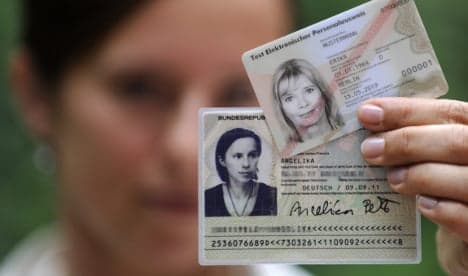Controversial new ID cards coming in 2010

The German Interior Ministry confirmed on Monday that new identification cards containing radio-frequency (RFID) chips will be introduced starting November 1, 2010 - but some data protection experts are critical of the decision.
“It’s smaller than the old one, but can do a lot more,” Interior Minister Thomas de Maizière said in a statement.
The information on the card itself will be digitally stored on the RFID chip inside the card, in addition to two fingerprint scans that German citizens can choose to opt out of. The ID will also have a digital signature that can be used to complete official business with government offices and possibly beyond – accessed only by a six digit PIN number.
“The citizens choose who they want to give what data to,” Interior Ministry official Hans Bernhard Beus said.
But data protection advocates say the RFID chip, which can be detected via radio frequencies from about two metres away without the owner’s knowledge, is problematic despite the fact it has already been incorporated into German passports.
Dr. Andreas Pfitzmann, head of the privacy and data security group at Technische Universität Dresden, told The Local on Monday that there is no reason to use RFID chips for identification cards, and that in the worst case scenario, the chips could be used to carry out such things as terrorist attacks.
“An extreme example would be that assuming German passports react differently to the radio frequency than American passports, I could use this frequency to set off a bomb where I know there are only Americans or Germans,” he said.
Pfitzmann, who specialises in privacy and identity management in Europe, spoke out against using RFID "e-passports" in parliamentary hearings during the late 1990s. He said the new ID cards raise similar concerns.
“Unfortunately the technology tempts people to give personal information that shouldn’t be made public to dubious machines,” he told The Local, adding that there was no way to indicate whether a reading machine is officially authorised. “The new identification card has inherited many of the bad traits of the passport.”
But the new Perso, as it’s known colloquially in German, also has some positive new additions such as the digital signature, which could help streamline Germany’s notoriously opaque bureaucracy, he said.
“There is no easy answer. One could have done some things better, but I wouldn’t simply say that it’s only negative just because mistakes were made,” Pfitzmann said.
All old identification cards will be valid until they expire, though German residents will have the option to trade up for the new ID early if they wish.
Comments
See Also
“It’s smaller than the old one, but can do a lot more,” Interior Minister Thomas de Maizière said in a statement.
The information on the card itself will be digitally stored on the RFID chip inside the card, in addition to two fingerprint scans that German citizens can choose to opt out of. The ID will also have a digital signature that can be used to complete official business with government offices and possibly beyond – accessed only by a six digit PIN number.
“The citizens choose who they want to give what data to,” Interior Ministry official Hans Bernhard Beus said.
But data protection advocates say the RFID chip, which can be detected via radio frequencies from about two metres away without the owner’s knowledge, is problematic despite the fact it has already been incorporated into German passports.
Dr. Andreas Pfitzmann, head of the privacy and data security group at Technische Universität Dresden, told The Local on Monday that there is no reason to use RFID chips for identification cards, and that in the worst case scenario, the chips could be used to carry out such things as terrorist attacks.
“An extreme example would be that assuming German passports react differently to the radio frequency than American passports, I could use this frequency to set off a bomb where I know there are only Americans or Germans,” he said.
Pfitzmann, who specialises in privacy and identity management in Europe, spoke out against using RFID "e-passports" in parliamentary hearings during the late 1990s. He said the new ID cards raise similar concerns.
“Unfortunately the technology tempts people to give personal information that shouldn’t be made public to dubious machines,” he told The Local, adding that there was no way to indicate whether a reading machine is officially authorised. “The new identification card has inherited many of the bad traits of the passport.”
But the new Perso, as it’s known colloquially in German, also has some positive new additions such as the digital signature, which could help streamline Germany’s notoriously opaque bureaucracy, he said.
“There is no easy answer. One could have done some things better, but I wouldn’t simply say that it’s only negative just because mistakes were made,” Pfitzmann said.
All old identification cards will be valid until they expire, though German residents will have the option to trade up for the new ID early if they wish.
Join the conversation in our comments section below. Share your own views and experience and if you have a question or suggestion for our journalists then email us at [email protected].
Please keep comments civil, constructive and on topic – and make sure to read our terms of use before getting involved.
Please log in here to leave a comment.